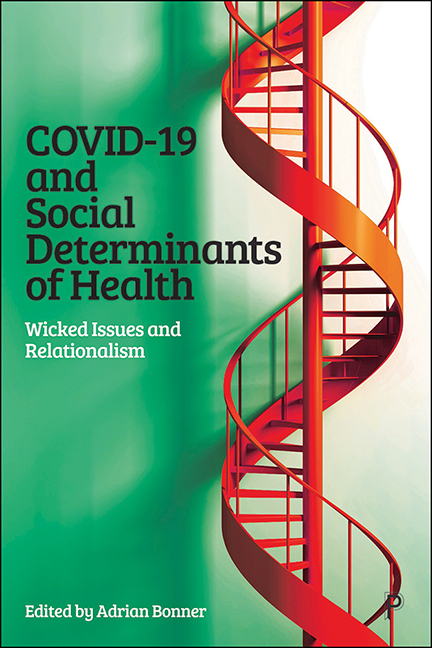Book contents
- Frontmatter
- Miscellaneous Frontmatter
- Contents
- List of figures and tables
- Notes on contributors
- Foreword
- Introduction
- Part I Wicked issues and relationalism
- Part II Regionalism and geopolitical environments
- Part III Public sector, COVID-19 and culture change
- Part IV The third sector
- Part V The case for relationalism
- Part VI Engagement and proposed changes
- Conclusion
- Appendix The Centre for Partnering
- Index
17.2 - Case study: Housing and homelessness
Published online by Cambridge University Press: 18 January 2024
- Frontmatter
- Miscellaneous Frontmatter
- Contents
- List of figures and tables
- Notes on contributors
- Foreword
- Introduction
- Part I Wicked issues and relationalism
- Part II Regionalism and geopolitical environments
- Part III Public sector, COVID-19 and culture change
- Part IV The third sector
- Part V The case for relationalism
- Part VI Engagement and proposed changes
- Conclusion
- Appendix The Centre for Partnering
- Index
Summary
Introduction
Housing, or living in a decent home, is a fundamental part of the lives of each and every one of us. Ongoing failure to rise to the challenge of creating the right types of homes in the right places that are affordable to those that live in them, improve the quality of their lives and contribute to tackling climate change, has resulted in increasing levels of homelessness, inequality and cost of living. This chapter explores how, even if policy changes created an environment where housing delivery could meet demand, this might actually be achieved.
Context
In Chapter 11 Peter Murphy sets out the trajectory of housing delivery since the war and highlights the shortcomings in policy that have led to a continued shortfall in meeting housing need. For many years, it has been left very largely to the private sector to deliver the majority of the new homes this country so badly needs. The result of this has been the delivery of largely single tenure, market sale homes, in a cookie-cutter style across the country at a rate that suits the housing developers, with little in the way of product innovation. With limited exceptions, the majority of new homes built have ignored the pressing issues facing the sector, namely, building more homes, of better quality across a range of tenure types that face up to issues such as climate change, homelessness and fuel poverty.
Is it little wonder then that the country faces a continued housing crisis? Nominal house prices have risen dramatically since the early 1990s and continue rising today, even in the midst of the COVID-19 crisis. This historic trend can be seen in Figure 17.2.
For those who can afford it, the market offers a narrow choice of largely pastiche houses delivered to environmental performance standards, captured in the Building Regulations. These have changed in small increments at irregular intervals and to howls of complaints and threats of unsustainable extra build costs from developers who still build homes in largely the same way that our Victorian forebears did! These houses are frequently riddled with defects and struggle to even meet the standards set for them (HMG, 2017, 2020 a).
- Type
- Chapter
- Information
- COVID-19 and Social Determinants of HealthWicked Issues and Relationalism, pp. 312 - 318Publisher: Bristol University PressPrint publication year: 2023



